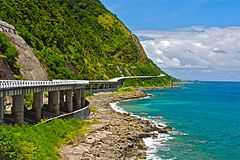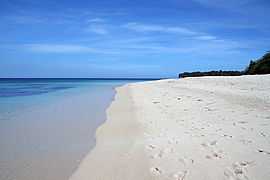Pagudpud
| Pagudpud | ||
|---|---|---|
| Municipality | ||
|
From top to bottom right: Welcome arch passing through Pan-Philippine Highway, Dos Hermanos islands, Bantay Abot cave, Patapat Viaduct overlooking Pasaleng Bay, and Blue Lagoon | ||
| ||
 Map of Ilocos Norte showing the location of Pagudpud | ||
.svg.png) Pagudpud Location within the Philippines | ||
| Coordinates: 18°34′N 120°48′E / 18.567°N 120.800°ECoordinates: 18°34′N 120°48′E / 18.567°N 120.800°E | ||
| Country | Philippines | |
| Region | Ilocos (Region I) | |
| Province | Ilocos Norte | |
| District | 1st District | |
| Founded | July 5, 1954 | |
| Barangays | 16 | |
| Government[1] | ||
| • Mayor | Marlon Ferdinand Torres Sales | |
| Area[2] | ||
| • Total | 194.90 km2 (75.25 sq mi) | |
| Population (2010)[3] | ||
| • Total | 21,877 | |
| • Density | 110/km2 (290/sq mi) | |
| Time zone | PST (UTC+8) | |
| ZIP code | 2919 | |
| Dialing code | 77 | |
| Income class | 4th class | |
Pagudpud is a fourth class municipality and a coastal resort town of Ilocos Norte province, in the northern Ilocos Region of the Philippines. According to the 2010 census, Pagudpud has a population of 21,877 people.[3] It is the northernmost settlement on Luzon Island.
The town is bounded to the south by the town of Bangui and to the east by the Cordillera Mountain Range, the town of Adams and the province of Cagayan. The South China Sea lies to the west and north. The town rolls over mountains, hills, valleys and flat coastal land. It lies 74 kilometres (46 mi) north of Laoag City, the provincial capital, and 561 kilometres (349 mi) north of Manila. They reside in 5,290 homes that are spread across 83 square miles (210 km2). Most make their living through farming, fishing and subsistence retailing. Tourism is a growing part of the economy.
Pagudpud was made a municipality on July 5, 1954. Unlike Laoag City, the province's only autonomous city, Pagudpud derives its authority from the provincial government. It had previously been a part of the neighboring town of Bangui.
Maira-ira Beach is the northernmost tip of Luzon Island located 18°39′4.44″N 120°50′46.68″E.
There are no ATM"s in Pagudpud. The nearest ATM is in Pasuquin which is about 1 and 1/2 hours from Pagudpud
Demographics
| Population census of Pagudpud | ||
|---|---|---|
| Year | Pop. | ±% p.a. |
| 1990 | 16,558 | — |
| 1995 | 17,168 | +0.68% |
| 2000 | 19,315 | +2.56% |
| 2007 | 20,385 | +0.75% |
| 2010 | 21,877 | +2.60% |
| Source: National Statistics Office[3][4] | ||
Barangays
Pagudpud is politically divided in 16 barangays:
URBAN
| Names of Barangay | Brgy.No. |
|---|---|
| Poblacion 1 | 1 |
| Poblacion 2 | 2 |
RURAL
| Names of Barangay | Brgy.No. |
|---|---|
| Saud | 12 |
| Caparispisan | 16 |
| Subec | |
| Aggasi | |
| Saguigui | |
| Baduang | |
| Burayoc | 3 |
| Dampig | |
| Tarrag | |
| Ligaya | |
| Caunayan | 5 |
| Balaoi | |
| Pancian | |
| Pasaleng |
Transportation
By land, Pagudpud is approximately a 90-minute bus ride from Laoag City. Several bus lines serve the Manila-Laoag route, namely Partas, Florida, Farinas, and Maria de Leon among others.Some bus lines serve also the pan-Philippine highway,dropping by in Pagudpud,namely Chona Patrick,GMW,St.Joseph,Gabriel,and the pan-Philippine highway route buses of Maria de Leon and Florida.
Attractions
Its white-sand beaches and crystal-blue water makes Pagudpud a haven for tourists. Maira-Ira Point is also an emerging attraction with its secluded beach known as the Blue Lagoon, as well as kilometer-long Saud Beach. Access to this public beach is from a secondary concrete road on the north side of the Maharlika Highway just before approaching the Patapat Viaduct. On the way to the Blue Lagoon, a sea arch can be seen. Coconut trees line much of the town's coast. On a clear day, the Babuyan Islands are visible from Patapat National Park.
The Patapat Viaduct, elevated 31 metres (102 ft) above sea level, is 1.3 kilometres (0.81 mi) concrete coastal viaduct that connects the Maharlika Highway from Laoag to the Cagayan Valley Region. It rises along the town's coastal mountains, which is the starting point of the Cordillera Mountain Range that snakes through Northern Luzon. It is the 4th longest bridge in the Philippines. Located more than 16 kilometers from the town proper, it offers a scenic view of Pasaleng Bay- a view that leads towards wide and pristine beaches backed by mountains with breathtaking waterfalls Kabigan and Mabaga, along with the many cool, refreshing springs waiting to be discovered within.
Kabigan Falls is surrounded by thick forest and well known for its concaved basin, located at the eastern part of Barangay Balaoi, about 1.8 kilometres (1.1 mi) away from the national highway. Kabigan falls is also part of the town of Pagudpud, Ilocos Norte and a trek going to this falls is usually included in the tricycle tour offered in the area. There is a 20 Pesos/pax entrance fee at the jump-off point where you will be assigned your official trek guide going to the falls. You don't have to worry about being lost or being conned in the area because the locals organized their official group to guide tourist and receive payment. The trek going to Kabigan Falls takes 30 to 40 minutes mostly of flat area so you'll have time to enjoy the verdant panorama. Although there is a visible trail going to the falls, you'll still need a tour guide if it's your first time there just to be safe.
Climate
| Climate data for Pagudpud, Ilocos Norte | |||||||||||||
|---|---|---|---|---|---|---|---|---|---|---|---|---|---|
| Month | Jan | Feb | Mar | Apr | May | Jun | Jul | Aug | Sep | Oct | Nov | Dec | Year |
| Average high °C (°F) | 31 (88) |
32 (90) |
33 (91) |
34 (93) |
34 (93) |
34 (93) |
33 (91) |
32 (90) |
32 (90) |
33 (91) |
32 (90) |
31 (88) |
32.6 (90.7) |
| Average low °C (°F) | 19 (66) |
20 (68) |
21 (70) |
23 (73) |
24 (75) |
24 (75) |
24 (75) |
24 (75) |
24 (75) |
23 (73) |
22 (72) |
21 (70) |
22.4 (72.3) |
| Average rainfall mm (inches) | 6.2 (0.244) |
11.7 (0.461) |
10.1 (0.398) |
14 (0.55) |
192.7 (7.587) |
258.9 (10.193) |
470.9 (18.539) |
475.9 (18.736) |
405.7 (15.972) |
92.5 (3.642) |
44.8 (1.764) |
2 (0.08) |
1,985.4 (78.166) |
| Avg. rainy days | 3 | 2 | 2 | 2 | 12 | 15 | 20 | 20 | 17 | 10 | 6 | 3 | 112 |
| Source: World Weather Online[5] | |||||||||||||
Gallery
-

Kabigan Falls in Pagudpud
-
Sunset at Burayoc Point at the juncture of Saud Beach near Pagudpud Rinnovati.
-

Saud Beach near Polaris Beach House
-
Saud Beach near Apo Idon resort. The Northwind Power windmills in neighboring Bangui can be seen in the distance.
-

The Patapat Viaduct
-

Saud Beach
See also
References
- ↑ "Official City/Municipal 2013 Election Results". Intramuros, Manila, Philippines: Commission on Elections (COMELEC). 11 September 2013. Retrieved 3 October 2013.
- ↑ "Province: ILOCOS NORTE". PSGC Interactive. Makati City, Philippines: National Statistical Coordination Board. Retrieved 3 October 2013.
- ↑ 3.0 3.1 3.2 "Total Population by Province, City, Municipality and Barangay: as of May 1, 2010". 2010 Census of Population and Housing. National Statistics Office. Retrieved 3 October 2013.
- ↑ "Province of Ilocos Norte". Municipality Population Data. LWUA Research Division. Retrieved 3 October 2013.
- ↑ "Pagudpud, Philippines: Average Temperatures and Rainfall". World Weather Online. Retrieved 15 September 2014.
External links
| Wikimedia Commons has media related to Pagudpud, Ilocos Norte. |
- Municipality of Pagudpud
- Article about Pagudpud and Saud Beach with plenty of Photographs
- Philippine Standard Geographic Code
- Philippine Census Information
- Local Governance Performance Management System
 |
Luzon Strait |  | ||
| Bangui Bay (South China Sea) | |
Santa Praxedes, Cagayan | ||
| ||||
| | ||||
| Bangui | Dumalneg / Adams |
| ||||||||||||||||||



